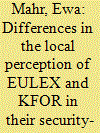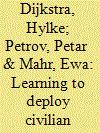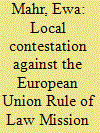| Srl | Item |
| 1 |
ID:
178613


|
|
|
|
|
| Summary/Abstract |
This article compares the local perceptions of the EU Rule of Law Mission in Kosovo (EULEX) with those of NATO’s mission Kosovo Force (KFOR) and investigates the reasons for observed differences. It focuses on an oft-overlooked aspect of EULEX: its broadly defined security-related tasks. Until recently, EULEX could be seen as a prominent security actor, thanks to its robust police component and its function as a second respondent. EULEX coexists in Kosovo with KFOR; while the former is civilian and the latter military, both play complementary roles in the security realm and some of their tasks are similar. However, the local perceptions of EULEX and KFOR regarding their execution of security-related tasks have differed, with only KFOR enjoying local acceptance. This article argues that such differences are caused by the missions’ differently perceived powers over local actors, as manifested through their ability to exert compliance and cooperation from local actors through coercion, the ability to offer rewards and legitimacy. By going beyond the well-researched initial gratitude of Kosovo Albanians to NATO/US for intervening in 1999, this article offers a more fine-grained analysis of Kosovo Albanian and Kosovo Serbian perceptions of EULEX and KFOR.
|
|
|
|
|
|
|
|
|
|
|
|
|
|
|
|
| 2 |
ID:
170754


|
|
|
|
|
| Summary/Abstract |
nternational organizations continuously deploy civilian capabilities as part of their peacekeeping and crisis management operations. This presents them with significant challenges. Not only are civilian deployments rapidly increasing in quantity, but civilian missions are also very diverse in nature. This article analyses how international organizations have learned to deploy their civilian capabilities to deal with a growing number and fast evolving types of operations. Whereas the previous literature has addressed this question for individual international organizations, this article uniquely compares developments in the United Nations (UN), European Union (EU) and Organization for Security and Co-operation in Europe (OSCE), three of the largest civilian actors. Drawing on the concept of organizational learning, it shows that all three organizations have made significant changes over the last decade in their civilian capabilities. The extent of these changes, however, varies across these organizations. The article highlights that the EU, despite its more homogeneous and wealthier membership, has not been able to better learn to deploy its civilian capabilities than the UN or OSCE. We show that the ability of these organizations to learn is, instead, highly dependent on institutional factors.
|
|
|
|
|
|
|
|
|
|
|
|
|
|
|
|
| 3 |
ID:
157980


|
|
|
|
|
| Summary/Abstract |
This article examines local contestation against the European Union Rule of Law Mission in Kosovo (EULEX), manifesting itself in local actors publicly demanding a change in the mission’s mandate and/or its operations. The article investigates how EULEX’s actions and its effectiveness are perceived and reacted upon by the local actors. It shows that local contestation is mainly fueled by (1) conflicting sovereignty claims by the majority Albanians and the minority Serbs; (2) the understanding of sovereignty by parts of society as entailing exclusive authority; and (3) dissatisfaction with the mission’s effectiveness. By addressing EULEX from a bottom-up perspective—that of the local actors—the article underlines the limitations of EU policies in post-conflict Kosovo.
|
|
|
|
|
|
|
|
|
|
|
|
|
|
|
|